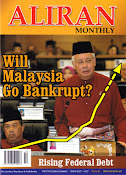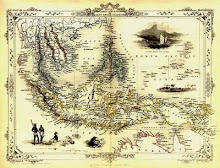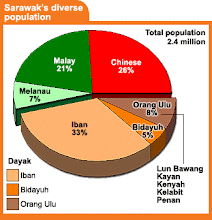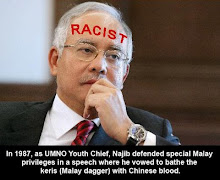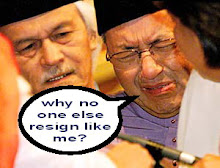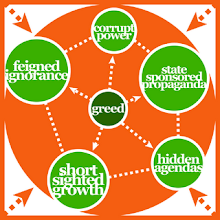Is
apostasy of any concern to Islam?
NOT AT
ALL.
Nor should it be. What therefore is all the fuss about, especially in Malaysia?
Is Islam or Muslims in Malaysia under attack from apostates from Islam or from
proselytizing Christians and others, perhaps even atheists and secularists?
Perhaps it is time for Muslims to
start thinking and behaving rationally in accordance with the real precepts of
Islam instead of merely reacting emotionally.
There are unconfirmed reports of
at least 100 “Muslims” converting to Christianity per month throughout Malaysia
and “estimates” that there are 30,000 Malay converts in total.
This is all probably much
exaggerated. Even if it is not exaggerated, there is really no cause for alarm, no matter how much Muslims may
dislike or feel uneasy about such a situation.
Adverse arrogant, intolerant and
irrational Malaysian Muslim reaction to this purportedly scary scenario has led
to some Christian propagandists claiming that “Coercion and threat of losing
life, family, or vocation is the ONLY way Islam keeps its followers faithful.
Such a beggarly religion is highly suspect. If there is someone called Allah,
and if the Koran is the revelation of Allah, why can the Koran and Allah not
keep the Muslim faithful? Why are death threats, and laws like these in
Malaysia, needed?” (Steve Van Nattan, Islam is coming apart in
the seams in Malaysia).
The matter has further been
politicized by the recent enforcement by Islamic religious authorities against
the use of the Name “Allah” by Christians and seizure of Bibles using the Name
“Allah”.
This of course is what some of the
non-Muslims would like to see, and Muslims behaving irrationally gives them
great delight – it is certainly part of their scheme to provoke Muslims into
behaving in this manner. Why should we give them this pleasure? Islam is
stronger than that and we as Muslims should strive to be strong as well.
We do not show strength by
arrogance, coercion or threats or by being intolerant or irrational – these are
all signs of weakness.
On the website www.apostatesofislam.com,
12 apostates purportedly from Malaysia may be counted, 5 of whom have stated
their current belief as “agnostic”, 4 “atheist” and 3 “Christianity”. Each of
these different types of apostates will have to be approached differently. Are
Muslim religious scholars actually equipped to dealing with any of them?
The
purpose of this website is very clear – to agitate Muslims. They state “Nothing
agitates a Muslim, as much as seeing a group of people who have left Islam.”
If we as Muslims become agitated
then they have achieved their aim. So why get agitated?
There is
nothing wrong with Islam, but as Muslims we have to accept the fact that there is
either something wrong with us as a community or with the apostates themselves
or perhaps both, as the reason for the occurrence of apostasy amongst us.
If there is something wrong with
us, then it is within our own power to correct it if Allah wills, but if there
is something wrong with the apostates, then it may not be within our power to
correct it, even if we go to the extent of killing them or imposing other
sanctions upon them, which will make a mockery of Islam and be of greater
detriment to the Muslim community.
Islam is
not mocked nor is it weakened by apostasy. Let us be clear about this.
We should not be concerned about
it by being agitated, intolerant or irrational – these are entirely different
things. Even if it is of no concern to Islam, we must take it seriously. We
must find out why it is happening and how we should deal with it. We can only
deal with it through knowledge and enlightenment.
If we and our religious scholars
and politicians do not know how to deal with it other than through coercion and
threat, then there is really something wrong with us as Muslims. Are we really
practising Islam?
First of all, if
Muslims accept the fact that the Qur'an is the literal Word of Allah that was
put in the mouth of the Prophet (pbbuh), which they do, then there cannot be
any contradictions, except for later verses which have abrogated other previous
verses.
On this issue the
Qur'an is very clear - there is no
compulsion in religion - that is a basic tenet of Islam. There really is or
should be freedom of choice to believe or not to believe in Islam. The Qur'an
itself does not specify any temporal or worldly penalty for not believing or
even for apostasy (which is essentially disbelieving after believing).
True belief does not
come from force or compulsion but from inner conviction. Muslims must accept
this fact and if we do then we cannot force anyone to become a Muslim nor can
we force anyone to stay in Islam.
How does this square
with the fact that punishment in the Hereafter is prescribed for not believing?
Isn't that compulsion and isn't that therefore a contradiction?
Here one has to be
extremely careful about one's position. Allah has prescribed punishment for
unbelief or disbelief and He has also prescribed that there should be no
compulsion in religion. What does this mean? Is Allah contradicting Himself
here?
Far from it, in fact
absolutely NOT.
Having prescribed a set
of beliefs or truths for mankind's guidance and way of life in Islam, Allah has
both also prescribed a punishment in the Hereafter for not believing and
following that guidance and way of life AND given mankind the choice of whether
to believe in it and follow it or not.
It cannot be any other
way. The choice of whether to believe in Islam or not is and must be voluntary
and of the individual's own free will, notwithstanding the other-worldly
punishment for not believing and accepting Islam.
If such punishment had
not been so prescribed, what would be the difference between believing and not
believing then? No difference! - because whether you believed or not you
wouldn't be punished. Happy bliss and real freedom of choice as far as
non-Muslims are concerned! They can say what they like about Allah and His
prescribed religion for humankind and get away with it - why become a Muslim
then when they can enjoy life, mock Muslims and Islam and not be punished for
it by Allah?
The difference is that
- just as with any other belief - no one can force anyone else to follow Islam
and become a Muslim. The acceptance of Islam and its beliefs must come out of
real and voluntary internal conviction. This is the meaning of "there is
no compulsion in religion".
It does not mean as
many Muslims, even so-called scholars, seem to believe, that one is free to
enter Islam but not free to leave it, i.e. apostasize.
There is no way
therefore that there can be any punishment in this life for not believing or
for apostasy.
Why does such a ruling
or "law" even exist in Islam therefore? This issue has of course
troubled many Muslim minds and been capitalised on by practically all
non-Muslims who point to it as a contradiction in the precept laid down by
Allah in the Qur’an that there is no compulsion in religion.
Let us be very clear
about one thing - given the explanation above, such a ruling or law is not in
accordance with the Qur'an or Allah's prescriptions and can therefore be
regarded as non-Islamic or un-Islamic, notwithstanding any
"scholarly" support for it or (mistaken) belief that it is/was prescribed
by Allah or His Prophet (pbbuh).
What therefore should
we make of any purported ruling by the Prophet (pbbuh) to "kill the
apostates" and which has become the basis for such a law in
"Islam"? Even if the majority of Muslims and Muslim scholars agreed
on it, it would not be right according to the basic tenets of Islam. Yet it
exists and Muslims are troubled to explain it or accept it without question or
critical enquiry.
Most Muslim scholars
who are against such a law point out that it is based on an unauthenticated
report. Whatever the case is, it certainly cannot be accepted as a bare ruling
or law which contradicts the Qur'an. The circumstances surrounding such a
ruling (if the fact of it has been authenticated beyond doubt) must also be
studied.
It is obvious that
there can be no human law in Islam against (plain) apostasy per se or by
itself. However, for example, apostasy which amounts to treason is or could be
an entirely different matter. Even then it could amount only to a man-made law
and not a Allah-given one. The Qur'an even cites the case of "multiple
apostasy" which would not be possible if the death penalty was the penalty
for even one instance of such an "offence".
Yet over the course of
time, such a man-made law could become "accepted" as Islamic, even if
there is no prescription for it in the real Islam. Would this make such a law
"Islamic"? I don't think so.
All nations have laws
against treason - most notably the penalty is death, although in some countries
a more "enlightened" citizenry with more "humane" ideas has
resulted in this being changed to life imprisonment, but a serious penalty
nevertheless.
There is obviously more
to the ruling "kill the apostates" than meets the eye and Muslims
should not accept it as it is nor should non-Muslims condemn Islam on the basis
of something which may not even be "Islamic" in the first place.
Many Muslims today,
just like non-Muslims as well, carry with them the baggage of centuries of
cultural, social and personal prejudices which to them represent
"Islam" but is far from the real teachings of Islam.
Most people (Muslim and
non-Muslim alike) find such entrenched prejudices self-comforting and will not
make any effort to change or to even enquire about what the real situation is
or should be, yet they will fight to the death and kill many innocents in the
process to preserve or worse still propagate what is in reality only highly
prejudiced and perverted beliefs.
There is no such thing
as blindly following Islam, and any such opinion is completely ignorant and
misguided.
Blindly following what
one believes to be "Islam" is a different matter, as also making
assumptions as to what Islam is and isn't.
There is no such thing
as terrorism in Islam. Islam does not allow indiscriminate mass killing or
destruction even in war and that makes any deliberate act which harms
non-combatants even worse.
Enemies and detractors
of Islam will say otherwise, as expected, but that does not change the truth.
The truth also is that
Islam is the world's fastest growing and living religion and that all this is
taking place without any compulsion or force, much to the dismay and dislike of
its enemies and detractors - who see the only way to deal with this phenomenon
is by force and military might.
Muslims must also realise
that Islam can defend itself without any resort to terrorism (as also without
resort to killing apostates), no matter how grave the provocation - that is the
strength of Islam, not indiscriminate acts of violence which only cause greater
hatred for Islam and Muslims.
Even the defeat of
Muslims can ultimately lead to the triumph of Islam - witness the conversion of
the Mongols to Islam after they had conquered the Muslims.
There is no shame in
defeat or strategic retreat. Muslims must, as they always have, learn to adapt
to changing circumstances without losing sight of Islam. We must learn that
Islam is strong enough to withstand any assault, whether by reason of apostasy
or any other factor.
Follow the example of
the Prophet (pbbuh). Why fight to lose? Proper Islamic strategies must be put
in place to respond to threat and provocation and proselytisation from the
non-Muslims, without resort to violence.
Muslims must be
self-disciplined and act properly in self-defence and not with outright
aggression against wrong targets. Easier said than done of course, but still
worth the effort in terms of Islam, personal salvation and human redemption.
Nobody said Islam was
easy.
To defend ourselves
from the assault of apostasy and proselytisation especially from some
Christians and secularist forces, we need only to strive to make Islam a living
force, not just a set of rules and regulations which are reluctantly followed.
Islam does not exclude common
people from its decision-making process and neither is governance in Islam the
exclusive province of only the religious scholars - who may also have their own
narrow prejudices which can influence their interpretation of Islam.
Most Muslims are generally not
bothered about making Islam a really integral part of their lives, yet become
very upset about purported apostasy from Islam becoming widespread.
Making Islam a really integral
part of their lives and not just a set of rules and regulations to be abided by
is probably the one thing that will rid all Muslim lands of oppression,
suppression and repression, both from Muslims themselves as well as
non-Muslims.
Most Muslim ruling elites are either happy with an entirely secular form of
government which is nominally democratic - i.e. only in appearance, democracy
being only a tool to gain power and wealth without needing to be answerable to
any Islamic principles at all, and if any only in name. Freedom without
responsibility. Subversion of human values under the guise of freedom of
choice. Tyranny masquerading as opportunity.
Other Muslim ruling elites have gone as far as to utilize the very principles
of Islam to institute forms of government which are Islamic in name only but
not in actual practice - Islam becomes for them a mere tool to keep their
populace under tight and ruthless control while they also control all the power
and wealth without having to be answerable to any Islamic principles
themselves. Repression without accountability. Oppression and suppression in
disguise. Hypocrisy of the highest order.
Where do we find the middle path here, the right balance between absolute
democracy and religious extremism, that will allow Malaysian Muslims a chance
to realize happiness both in this life as well as the hereafter?
While Islam in its original form must be protected, Muslims today must also
learn to deal constructively with new things or bid'ah, as changes take
place every second. These changes present constantly new challenges to Muslims.
How do we meet them without sacrificing Islam? How do we adapt to them without
ourselves changing into something which is un-Islamic?
Not everything new is un-Islamic. Muslims must continue to be in the forefront
of science and knowledge and examine all things on the basis of Islam and
Islamic principles and tenets.
Islamic justice must be properly understood by the scholars and ordinary
Muslims alike if we are to ensure that Islam remains relevant to our lives and
to reduce instances of apostasy.
There is no compulsion in religion and our duty is only to pass the message, the
reception of which we have to leave to Allah. Islam has never needed to be
spread by use of force.
Allah has given humans freedom of choice to accept Islam or reject it. Who are
we to force it upon others or to force anyone to remain in Islam? Do we want to
be continually at war with non-Muslims who reject Islam, including those
“Muslims” who apostasize? Is it even necessary?
There are some things we may ultimately have to leave to Allah's judgement and
included in this category is the subject of apostasy – it is completely beyond
human means to enforce any punishment, other than in exceptional cases.
Nation-states for the time being
are the only effective means to organise. In this age of American hegemony and
imperialist ambitions, Muslims must first, along with the rest of the oppressed
peoples of the world, challenge the American and European-led and oppressive
international system which subjugates the majority of the globe so the
interests of the West, and more specifically America, are served. Once Muslims
countries improve their economies, standards of living etc. only then can we
really speak of unity. It won't work as long as half of the people are
starving.
The problem with this is that many of the Muslim nation-states are controlled
by elites who subjugate and oppress their own people. Under these circumstances
it is not easy to challenge the oppressive international system, although
obviously I would agree that this needs to be done.
Many Muslim countries are in fact rich in natural resources, and there is no
necessity for their people to remain poor, other than for the fact that the
wealth of their countries has deliberately been controlled by their elites and
not equitably distributed - this is un-Islamic, but has become a norm in many
Muslim countries.
“A few
years ago, during question-answer session in the Islamic Center of Greater Toledo,
a member inquired about the punishment for apostasy in Islam. It is an
unfortunate common belief among many Muslims that Shariah prescribes death for
the apostate!!!
I was once an apostate and openly declared I did not believe in Islam and
rejected even the existence of Allah. Thank Allah! I was then living in a
country, India, where people did not execute apostates. I thank Allah for
giving me a chance to repent and return to the fold of Islam. I, being an
apostate once, became free from the cultural and ethnic Islam to study true
Islam with an open mind. "Islamic scholars" and imams do not anymore
control my mind and beliefs unless their decrees (fatawa) are (1) in conformity
with the Qur'an, (2) the hadiths that they quote do not contradict the Qur'an.
Many Muslims today
practice an ironic form of idolatry (in Islamic terminology, shirk, the one sin
Allah does not forgive). We, Muslims, criticize other religions for not being
truly monotheistic, yet so many of us are guilty of another, more subtle form
of shirk: we worship our scholars instead of Allah! We commit the sin for which
other people are condemned by Allah in the Qur'an:
"They have taken as lords besides Allah their rabbis and their monks and
the Messiah son of Mary, when they were bidden to worship only one Allah. Be He
glorified from all that they ascribe as partner unto Him!” [9:31]
Now, most classical commentators of the Qur'an agree that the grave
transgression alluded to here is not the literal worship of the learned people.
According to Tirmidhi, the Holy Prophet was asked to explain this verse by Adi
ibn Hatim, a convert (or apostate) from Christianity, and he confirmed that the
sin was the people, "considering lawful what their priest declared lawful,
even though it was forbidden by Allah." (Al-Jami, 44:9;IJ).
I believe that many Muslims are reluctant to speak up because many
"Islamic" cultures today encourage docility and teach to
unquestioningly accept the decisions of "qualified" scholars. This is
a new phenomenon; in the time of Muhammad (s), ideas were only supported after
they had been proven to be in harmony with the Qur'an. Scholars could not just
pull rank, as they were expected to be able to argue their cases. In fact, in a
famous incident of Islamic history, a humble woman of Medina publicly corrected
the Caliph. One day, Hazrat Umar (RA) was announcing a change in the rule mahr,
when the woman in the crowd suddenly stopped him in his track by loudly quoting
a verse of the Qur'an which contradicted his proposal. He had to relent,
saying, "The women of Medina know the Qur'an better than Umar." So,
it is time for Muslims to question the imams and scholars if they deviate from
the Qur'an and hadiths that do not contradict the Qur'an. We must not only be
satisfied by the answer of the scholars, but we must verify the source of their
references. Remember, if Hazrath Umar (RA) can make a mistake, ordinary
scholars and ordinary people like us also can make greater mistakes.
The Qur'an and the sayings of the Prophet (s) require Muslims to think
critically. Pagans are repeatedly berated for not questioning, for not using
reason, even being compared to dumb animals on several occasions!
"When it is said unto them: 'Follow that which Allah has revealed:' they
say: 'Nay! We shall follow the ways of our fathers.' What! Even though their
fathers were void of wisdom and guidance?....Deaf, dumb, blind, therefore they
have no sense.” [2:170-171]
"He it is Who has
sent down to thee the Book: In it are verses basic or fundamental (of
established meaning); they are the foundation of the
Book.....” [3:7]
"Will they not then ponder on the Qur'an? If it had been from other than
Allah they would have found herein much incongruity.” [4:83]
So, the principle established here is that (1) Muslims are required to think
critically and not blindly accept the authority of their scholars, and (2) that
the clear message of the Qur'an is to be preferred to any isolated law
interpretation which contradicts the Qur'an's clear spirit.
The Qur'an teaches that human beings are individually responsible. So, I
believe that Allah would not forgive my sins on the Day of Judgment even if my
sins were the result of following the advice of a certain Imam. I would not be
able to hide behind any Imam or behind his fatwa even if coming from the most
respected and revered Imam of any time.
Therefore, views expressed here are my opinions based on the references given.
I do not claim to be a scholar, but there are sometimes cases where the
violation of the Qur'an is so self-evident that all Muslims can see them.
I believe that inhuman law of apostasy has nothing to do with Islam of the
Prophet (s) and it is an interpolation into Islam by fanatics among us and the
selfish rulers. There are many reasons for me to believe that execution for
apostasy is a manufactured law rather than divine law.
Holy Prophet (s) spent his entire life fighting in defense of fundamental human
rights that everybody should be free to choose his religion; no one must be
physically forced to change religion. Prophet (s) struggled with the Meccan
establishment to have the freedom to invite non-believers to Islam. This was
consistent with the practices of all other Prophets.
The Qur'an states:
"...There is no compulsion in religion. The right direction is here forth
distinct from error...”[2:256]
In the light of the above verse, a person has to be insane to belief that Islam
prescribes execution for apostasy.
The Qur'an further
states:
"Say (Muhammad) it
is the truth from the Lord of all. Whosoever will, let him believe, and
whosoever will, LET him disbelieve.” [18:29]
In no uncertain terms, Allah commands Prophet to allow people to believe and
disbelieve. If the Shariah recommends to kill an apostate, this law cannot be
Islamic because it contradicts the above two verses.
The Qur'an further states:
"And so, O Prophet, exhort them, thy task is ONLY to exhort; thou canst
NOT compel them to believe.” [88:21-22]
"Thy duty is to make the message reach them; it is OUR PART to call them
to account." [13:40]
"Call thou (all mankind) unto thy Sustainer's path with wisdom and goodly
exhortation, and argue with them in MOST KINDLY MANNER...” [16:125]
While the Qur'an commands the Prophet (s) not to compel people to believe in
Islam and invite people with the most kind manner and words, fanatics among us
threaten people with death mercilessly to keep them in the Muslim Ummah as
hypocrites as if the dishonest hypocrites are better than honest apostates. It
is a most heinous crime against Islam and Prophet (s) to manufacture inhuman
law of execution of apostate. If the Qur'anic verses tell the Prophet not to
compel people to believe in Islam (88:22) and the responsibility to call
disbelievers to account rests with Allah only (1:40), the law of execution of
apostates is of human origin.
Initial reluctance of the people of Arabia to accept Islam disturbed Prophet
(s). Then the following verse was revealed:
"And had your Lord willed, whoever in the earth would have believed all
together, will you then coerce people to become believers?” [10:99]
According to the above verse, even Allah will not coerce people to become
Muslims or remain as Muslim once a person accepts Islam. So, Muslims must
condemn the law of apostasy and save innocent Muslims becoming intolerant and
violent by the henious indoctrination by fanatics among us because Allah says:
"Who can be more
wicked than the one who invent a lie against Allah,...” [6:93]
So, religious belief is a personal matter. It is Allah alone -- not the state
or religious authorities -- who know what is in the heart of the people. If the
highest human authority, Prophet (s), cannot call anyone to account for belief
or disbelief, no sane person can believe that religious scholars and the state
have the authority to execute people for their personal belief.
The Qur'an states:
"A section of the People of the Book say: 'Believe in the morning what is
revealed to the believers, Bur reject it at the end of the day; perchance they
may (themselves) turn back." [3:72]
A section of People of the Book used a tactic to create doubt among the Muslims
in the hope that some of them might thereby be beguiled into repudiating Islam.
How could it be possible for non-Muslims to have enacted this plan to entice
Muslims to believe one day and reject next, if death was the penalty for
apostasy? This tactic of a group of People of the Book mentioned in the Qur’an
exposes apostasy law of the Muslim fanatics as un-Islamic. In spite of the
deceptive behavior, the above verse cautions Muslims that “perchance they may
themselves turn back” truly to Islam. The Qur’an does not rule to kill the
apostates.
Abdullah b. Ubayy b. Salul was the leader of the munafiqun (hypocrites). But
Prophet (s) took no action against him. Prophet (s) prayed for him and stayed
at the grave until he was buried. Those fanatics among us must explain the
reason for Prophet (s) not executing the known hypocrites like Abdullah b.
Ubayy. Ubbay lived until death plotting to destroy Islam and Prophet (s) knew
it. He was not executed for apostasy. This suggests that apostasy law is not a
divine law but interpolation by fanatics among us.
Another verse states:
"Those who believe, then reject Faith, then believe (again) and again
reject Faith, go on increasing in Unbelief -- Allah will not forgive them nor
guide them on the Way.” [4:137]
An apostate cannot enjoy the repeated luxury of believing and disbelieving if
punishment is death. A dead man has no further chance of again believing and
disbelieving. Furthermore, if taken at face value, this verse indicates that
Allah will only withdraw His guidance after repeated rejections. It does not
tell Prophet (s) to kill these apostates. So, what right do these religious
authorities and imams have to deprive a person of access to the divine guidance
after the first?
The Qur'an states:
"How shall Allah
guide those who reject Faith after they accepted it and bore witness that the
apostle was true and that clear signs had come unto them? But Allah guides not
a people unjust. Of such the reward is that on them (rests) the curse of the
Allah, of His Angels, and of all mankind; -- In that will they dwell; nor will
their penalty be lightened, nor respite be their lot; -- except for those that
repent (even) after that, make amends; For verily Allah is oft-forgiving, most
merciful.” [3:86-89]
It is obvious from these verses that no punishment is to be inflicted by one
man or another for apostasy. By no stretch of the imagination can the phrase,
"curse of Allah," be interpreted to be a license to murder anyone who
he considers to be an apostate. If any such commandment was prescribed it would
have been clearly defined as all other punishments are in the Holy Qur'an.
The fact is that the Qur'an even mentions that apostates can be forgiven if
they amend and repent. How could they repent if apostates are killed? By forced
repentance? Then, does not Qur'an state that there is no compulsion in
religion? The one verse that states that there is no compulsion in religion
should be enough for a fair minded person to realize that Islam does not teach
death to apostates.
Finally, can any one hadith suggesting to kill the apostate invalidate all the
Qur'anic verses quoted earlier? We, Muslims, blame the West for anti-Muslim
reporting. What do you expect from the West if we provide the sticks to beat us
up? Will Muslims object the persecution of the new Muslim convert for his/her
apostasy by his/her erstwhile co-religionists? If we believe that it is
injustice to kill a new Muslim by non-Muslims for his/her apostasy from his/her
former faith, you must give the same just treatment to Muslims who become
Christians, Jews, Hindus, atheists, etc. Let Allah call to account those people
who left Islam.
I, like many Muslims, am still bitter over smear jobs done on my religion by
Western media over the Gulf war, and the Rushdie affair. So, the last thing
that I want is to see Islam slandered all over again because of the barbaric
and un-Islamic apostasy law. Ask yourselves: what kind of religion kills people
for simple choice of faith, a change of heart? Not a religion of love and
peace, not a religion worthy of respect! Perpetuation of the law to kill
apostates can only increase or create doubts in the heart of the Muslims and
potential Muslims, as people everywhere are already bombarded by negative
images of Islam.
My message to those Muslims who, like me, yearn to project true compassionate
face of Islam is that Dawa will never be successful in the West as long as
crazy nonsense of law of apostasy is unchallenged by Muslims. If Muhammed Ali,
Cat Stevens, and Murad Hoffman were harassed by a reactionary Christian group,
the Muslims will be up in arms! We must be consistent in our attitude and
compassionate to those Muslims who want to leave Muslim community.
"Believers, men and women, are protectors, one of another: they enjoin
what is just, and forbid what is evil....” [9:71]
Therefore, let us protect the rights of all people to have freedom to believe
and disbelieve. In closing, Islam is only vulnerable when Muslims abandon its
clear teaching of reason, religious freedom, tolerance, and peace.”
There is only one cure for that -
education and critical thought, especially on the real basis and tenets of
Islam - the path in Islam has been clearly set – worship of Allah, prayer,
spirituality, righteousness, piety, knowledge, good thought, good action, good
behaviour, good deeds, trust, humility, kindness, tolerance, justice, equity,
legitimacy, faith, reason, rationale, charity, peace, forgiveness, compassion,
mercy, brotherhood and love.
These are all powerful weapons
against oppression, wrongdoing and injustice.
Muslims have to figure out for themselves where they are going wrong if they
wish to avoid getting frustrated by oppressive and unjust conduct of other
Muslims as well as non-Muslims - to the extent that they are willing to blow
themselves up along with innocent victims and call for the killing of apostates
who do Islam and the Muslim Community no harm (they only harm themselves after
all).
Did Allah give any Muslim the
right to do what many assume they can do in His Name and in the name of Islam,
when it is only their own egos which make such assumptions?
The Shari'ah (Islamic Law) is only
one part of Islam. In the Qur'an and Sunnah (Examples or Way of the Prophet
(pbbuh)) will be found the basis of Islam and the Shari'ah. When there is an
apparent "conflict" between Sunnah and Qur'an, then depending upon
the context and situation, the Qur'an takes precedence.
Everything in Islam is
logical. Study of plain texts must always take into account the context,
situation and explanation of any ruling and further purported rulings which are
based on it. Rulings in Shari'ah also do take into account, among other
matters, present circumstances - as long as the basics are adhered to and not
changed.
When scholars disagree,
usually the ruling with the more "merciful" interpretation is to be preferred.
There is no question of any logic-chopping or white-washing in Islam, except in
the fertile and futile imaginations of its detractors.
What passes off as
Shari'ah in some Muslim countries and which defies logic is simply un-Islamic.
Any law purportedly in the Shari'ah which provides for death for plain apostasy
(irrespective of circumstances) is un-Islamic and is based on a non-logical
interpretation of both the Qur'an and Sunnah.
Unfortunately, there do
exist illogical Muslims, as with other communities as well.
The fact is that the
basic tenet in Islam that there is no compulsion in religion has never been
abrogated. If this is a myth, conqueror would not have taken on the religion of
the conquered and Islam would have become a dead religion long ago. The truth
is clear from error.
At worst, Muslims can
say that anyone who leaves Islam is stupid, but they do not have the right to
kill him because of that. We can only leave it to Allah to deal with such
persons on Judgement Day.
My view is that the penalty for
apostasy in Islam is as stated in the Qur'an below:
"Those who believe, then disbelieve, then again believe, then disbelieve
and thereafter go on increasing in disbelief, Allah will never forgive them,
nor guide them to any way of deliverance". (4:137)
I think that it would immediately be obvious that if a person were to be put to
death for apostasy, i.e. for disbelieving, it would not be possible to
"believe, then disbelieve, then again believe, then disbelieve..."
A basic tenet in Islam is that there is no compulsion in religion. Death for
apostasy therefore does not make any sense, unless such apostasy was
accompanied by a betrayal of or treason or enmity/fighting against the Islamic
state/community.
Perhaps it may be useful to look into the context and circumstances of the
hadiths decreeing the death penalty so that this controversial (and to me
unnecessary) subject is laid to rest.
My opinion is close to that in the following article:
"Is Killing An Apostate in
the Islamic Law?" by Ibrahim B. Syed, Ph.D.
President of the Islamic Research Foundation International, Inc.
“Ridda or Irtidãd:
Literally means "turning back". The act of apostasy -- leaving Islam
for another religion or for a secular lifestyle.
Murtadd: Literally means "one who turns the back." An
apostate.
Murtad Fitri: Literally means apostate - natural. A person born
of a Muslim parent who later rejects Islam.
Murtad Milli: Literally means apostate - from the community. A
person who converted to Islam and later rejected the religion.
Due to lack of education and critical thinking several myths have taken root in
the Muslim world over the ages, and there have not been any efforts in the past
to clear these doubts. On the contrary, there has been a sort of effort to
strengthen these myths and misconceptions. These misinterpretations of Islamic
teachings have taken their toll on the Muslim world and have strengthened a
misplaced perception that Islam is a symbol of obscurantism, a religion of
intolerance and answers everything with the sword.
And there is no bigger misconception - strengthened with misunderstanding of
Islamic beliefs over the years - other than the belief that Islam doesn't
tolerate apostasy. The Christian missionaries and the Western world are cashing
in on it. Ulama have tried to strengthen their point of view and several
leading Muslim reformists have failed to tackle the issue. This misconception
has also presented Islam as a medieval and killer religion. Islam bashers have
time and again tried to carry the point by pointing out that Islam orders the
killing of a person if he or she reverts to another religion from Islam.
Nobody has come forward to challenge this widely held belief as well as put
forth a convincing argument about the misinterpretation of Qur'anic teachings
by Ulama (Muslim religious scholars).
The Qur’an is completely silent on any worldly punishment for apostasy and the
sole Tradition that forms the basis of rulings is open to many interpretations.
Prophet (pbuh) is reported to have said: ‘Whosoever changes his religion, kill
him (man baddala Dinahu faqtuluhu)’”. It is this last quote from the Prophet
that forms the basis of the said ruling.
While jurists are agreed on the authenticity of this tradition, they differ
very widely on the appropriate interpretation and thus, the law concerning
apostasy. Understanding the different viewpoints, and arriving at the truth is
crucial to our discussion of this subject.
This tradition does not refer to Muslims who leave the religion of Islam for
other religions. Finally, there is the crucial dispute over the nature of the
punishment and the crime. Al-Nakha’ee and, according to Sha’rani, al-Thawri,
hold that the apostate is a grave sinner who should however be continuously
called back to the fold for the rest of his life, and not killed.
By implication, they do not consider the offence a hadd (fixed penalty) offence
with a fixed punishment that must be carried out. This view is similar to the
view that apostasy is a sin that carries no fixed punishment, and any penalty
for it is discretionary (ta’zeer). This is a view held by the Hanbali scholar,
Ibn Taimiya and he attributes it as well to the Maliki Imam al-Baji. Among
Hanafites, the jurist Shamsuddeen al-Sarakhshi holds the same view. He says in
al Mabsut that the fixed penalties or hudud are generally not suspended because
of repentance, especially when they are reported and become known to the Imam.
He then adds in the case of apostasy “renunciation of the faith and conversion
to disbelief is admittedly the greatest of offences, yet it is a matter between
man and his Creator, and its punishment is postponed to the day of Judgement.
(“fa’l jaza’ ‘alayha mu’akhkhar ila dar al-jaza”).
If repentance is accepted, then apostasy is not a hadd offence with a fixed
punishment. Secondly, once scholars accept that a Muslim apostate has the right
to be given the opportunity to repent, they lose the right to set a time limit
for his repentance.
Allah (SWT) says in the
Glorious Qur’an (39: 53-54: Say: “ O you servants of Mine who have transgressed
against your own selves! Despair not of Allah’s mercy. Behold Allah forgives
all sins, for verily He is much forgiving, a dispenser of grace! Hence, turn
toward your sustainer and surrender yourselves unto him before the suffering
(of death and resurrection) comes upon you for then you will not be succored.”
Any scholar who says the death sentence applies to leaving the faith, then the
convict is to be given a life-time to repent, and this is the view of Sufyan
al-Thawri, Ibrahim al-Nakha’ee, Shamsuddeen al-Sarakhshi, Imam al-Baji and, by
strong implication, Ahmad Ibn Taimiya. One must conclude that the death
sentence is not for “simple apostasy” (mujarrad al-ridda), but for apostasy
accompanied by treason and sedition, or by the abuse and slander (sabb) of the
Noble Prophet.
Freedom to convert to or from Islam
"Everyone has the right to freedom of thought, conscience and religion;
this right includes freedom to change his religion or belief, and freedom,
either alone or in community with others and in public or private, to manifest
his religion or belief in teaching, practice, worship and observance."
Article 18 of the Universal Declaration of Human Rights.
The Glorious Qur'an says, "Let there be no compulsion in the religion:
Surely the Right Path is clearly distinct from the crooked path." Al
Baqarah, 2:256.
"Those who believe, then disbelieve, then believe again, then disbelieve,
and then increase in their disbelief - Allah will never forgive them nor guide
them to the path." Surah An-Nisa', 4:137.
For example, the Qur'an says: "Let him who wishes to believe, do so; and
let him who wishes to disbelieve, do so." (Al-Kahf: 29)
In another verse, Allah Almighty says: "Yours is only the duty to convey
the message; you are not a guardian over them." (Al-Ghashiyah: 21- 22)
The quotation from
Surah An-Nisa', 4:137, shown above, seems to imply that multiple, sequential
apostasies are possible. That would not be possible if the person were executed
after the first apostasy.
From the above verses
it can be argued that religious freedom and the absence of compulsion in
religion requires that individuals be allowed adopt a religion or to convert to
another religion without legal penalty.
Hence the death penalty is not an appropriate response to apostasy.
The former Chief
Justice of Pakistan, SA Rahman, has written that there is no reference to the
death penalty in any of the 20 instances of apostasy mentioned in the Qur'an.
Muslims who support the death penalty for apostasy use as their foundation the
above cited hadith, in which the Prophet (pbuh) is reported to have said:
"Kill whoever changes his religion." But this is a weak foundation
because this hadith was only transmitted from Muhammad (pbuh) by one individual.
It was not confirmed by a second person. According to Islamic law, this is
insufficient confirmation to impose the death penalty. The Shari`ah has not
fixed any punishment for apostasy.
The hadith is so generally worded that it would require the death penalty for a
Christian or Jew who converted to Islam. This is obviously not the prophet's
intent. The hadith is in need of further specification, which has not been
documented. Many scholars interpret this passage as referring only to instances
of high treason. (e.g. declaring war on Islam, Muhammad (pbuh), Allah, etc.).
There is no historical record, which indicates that Muhammad (pbuh) or any of
his companions ever sentenced anyone to death for apostasy.
The issue of killing a murtad or the apostate is not a simple one. Scholars
have debated it from various angles and it is not simply an issue of killing
someone for choosing one religion or another.
The question of apostasy has been debated among scholars based on their
interpretations of some hadiths since the Qur'an does not specify any worldly
punishment for it. For example, there was a case at the time of the Prophet
(peace and blessings be upon him) where a man came to him in three consecutive
days and told him that he wanted to apostate. The Prophet (peace and blessings
be upon him) never took any action against him, and when the man finally left
Madina, the Prophet (peace and blessings be upon him) never sent anyone to
arrest him, let alone kill him.
This is why some
scholars distinguished between individual apostasy and apostasy which is
accompanied by high treason. So, it cannot be confused with the freedom of
conscience for every individual, which has been guaranteed in the Qur'an
through hundreds of verses.
For example, one version of a hadith narrated by `A'isha (RA) concerning
apostasy relates to one who left his religion and fought against Muslims.
QUR'ANIC VIEWS
The Qur’an has referred to the issue of apostasy at more than one place (for
example see Al-Baqarah 2: 217, Al-Baqarah 2: 108, A’l Imra’n 3: 90, Al-Nisa’ 4:
137 and Al-Nahl 16: 106). But at none of these places does the Qur’an mention
the punishment of death for such people who change their religion. The Qur’an
does mention that such people shall face a terrible punishment in the hereafter
but no worldly punishment is mentioned at any of these instances in the Qur’an.
This situation obviously raises a question mark in the mind of the reader that
if Allah had wanted to give the punishment of an apostate a permanent position
in the Shari`ah, the punishment should have been mentioned, at least at one of
the above mentioned places. If the Qur’an had kept completely silent about the
apostate, the matter would have been different. But the strange thing is that
the Qur’an mentions apostasy, and still does not mention the punishment (if
any) it wants the apostate to be subjected to.
Furthermore, the Qur’an has strictly disallowed the imposition of the death
penalty except in two specific cases. One of them is where the person is guilty
of murdering another person and the other is where a person is guilty of
creating unrest in the country (fasa’d fil-ardh) like being involved in
activities that create unrest in a society, for example activities like
terrorism etc. The Qur’an says:
“Whoever kills a person without his being guilty of murder or of creating
unrest in the land, it is as though he kills the whole of mankind.”
(Al-Ma’idah, 5: 32)
Obviously, apostasy can neither be termed as "murder" nor
"creating unrest in the land".
Thus, in view of the
above facts, we are left with one option only. We can only say that either the
saying has been wrongly ascribed to the Prophet (pbuh), as it is clearly
contradictory to the Qur’an and the Prophet could not have said anything
contradictory to the Qur’an, or that the saying ascribed to the Prophet (pbuh)
relates not to all apostates but to a particular and specific people.
Shaykh Subhani
Shaykh Inayatullah Subhani (author of the book “Apostasy doesn't carry the
death penalty in Islam”) says that neither Islam forces any person to embrace
neither Islam nor it forces him to remain within its fold. He writes,
"Apostasy has been mentioned several times in Qur'an. It also describes
the bad treatment that will be meted out for committing apostasy, but it never talks
of punishment for the crime in this world." The learned scholar mentions
three Ayaat (verses) from Qur'an on apostasy (Al-Baqara 217, Muhammad 25-27 and
Al-Maida 54) and then says that none of these Ayaat prescribes any punishment
for that though these Ayaat pass strictures on the people who commit it. There
are several other Ayaat on the same issue and none of them prescribes either
death penalty or any other punishment for apostasy in this world. He then adds
that had there been some punishment in Islam for apostasy there was no reason
as to why the issue was mentioned repeatedly in Qur'an but no punishment was
prescribed.
Misinterpretation of the hadith, Man baddala Dinahu faqtuluh (kill him who
changes his religion) has caused the problem. This order has been made to look
general and permanent, though it was said in a particular circumstance for a
particular group. Shaykh Subhani writes that this order was made to counter a
scheme prepared by Jews of Madinah. They had planned that some of them embrace
Islam for some time and then return to their old religion. Then some other
people do the same. It was aimed to create restlessness among Muslims against
their own leadership so that the strong Muslim unity should start crumbling. It
was made clear in Qur'an in (Aal Imran, 3: 72-73).
To counter this planning the Prophet (SAW) ordered his companions to act in
such a manner. Despite this order lengthy investigations were made to ascertain
that the case was true and the person concerned was given adequate time to
explain before the punishment was carried out.
Shaykh Subhani says lack of clear grasp of Qur'an misguided even leading Ulama.
Otherwise it was not difficult to understand the hadith. Qur'anic teachings on
the issue were not kept in mind.
He emphasizes that people who were awarded death penalty for reverting to other
religions from Islam during the time of the Prophet (SAW) or during the reign
of his caliphs were not given the punishment for the crime of apostasy but for
the fact that they were at war with Muslims and Islamic government.
Shaykh Subhani regrets that punishment that was prescribed for certain people
under special circumstances was made to look like a general order. He says that
it was the order for people who posed threat to Islamic state and became at war
with Islam and not for any person who reverts to other religion.
A number of Islamic scholars from past centuries, Ibrahim al-Naka'I, Sufyan
al-Thawri, Shams al-Din al-Sarakhsi, Abul Walid al-Baji and Ibn Taymiyyah, have
all held that apostasy is a serious sin, but not one that requires the death
penalty. In modern times, Mahmud Shaltut, Sheikh of al-Azhar, and Dr Mohammed
Sayed Tantawi have concurred.
In conclusion, we must never confuse the issue of killing a murtad with the
freedom of conscience guaranteed in the Glorious Qur'an. For a detailed
discussion, one should read (1) the Dr. Yusuf Al-Qaradawi's book on this issue:
Jareemat ar-riddah wal murtadd (The Crime of Apostasy and Apostate) - published
by Ar-Risalah foundation.
(2) Apostasy doesn't carry death penalty in Islam (Book: Tabdili-e-Mazhab aur
Islam) by Maulana Inayatullah Asad Subhani)-published by Idara Ihya-e-Deen,
Bilariya Ganj, Azamgarh (UP, India) Pages: 108, Price Rs 30.”
It takes sincerity of
heart to acknowledge the Absolute Unity or Oneness of Allah. This is the very
essence of Islam and is the very 1st Commandment of ALL the Prophets.
Allah is Allah. There
is nothing else like Him. Anything else other than Allah is not Allah. Only He
alone is worthy of worship. To Him alone do we pray to guide us to the Straight
Path (the Right Way).
Each person is
responsible only for his own sins. Sincere repentance will lead to Allah's
forgiveness, the consequence of which is as stated in the Qur'an, Surah Al
Furqan (25:70):
"...Except he who
repents, believes, and does righteous deeds, for Allah will change the evil deeds of such persons into good deeds, and
Allah is ever Forgiving, Most Merciful..."
True sincerity in Islam
means that one does not do or avoid doing anything for rewards or out of fear
of punishment. This however does not exclude ordinary sincerity where one does
anything or avoids doing anything for the rewards which Allah has promised
believers or because of punishment Allah has decreed for transgressors.
What more could anyone
ask for? That is about as simple as it gets. There is no necessity for all
kinds of convoluted and contrived doctrines and no need to argue about or harm
or kill anyone over anything. All else is embellishment and perversion of the
True Essence of Islam.
Al Tugauw
REFERENCES
3.
S.A. Rahman, "Punishment of apostasy in Islam,"
Kazi Publ., (1986). (Limited availability from Amazon.com online bookstore).


